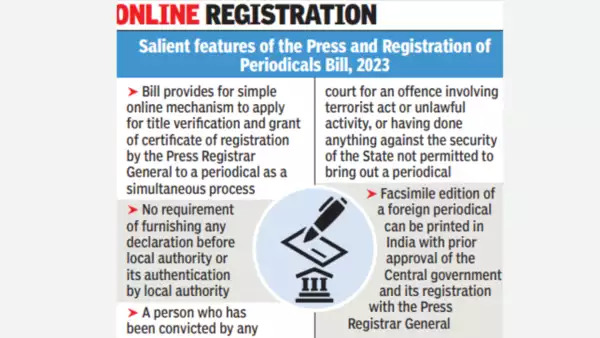The measure was approved by the Lok Sabha in December 2023 with very few members of the Opposition present in the House, and by the Rajya Sabha in August 2023 despite much clamour from the Opposition. The President has given his approval, and the rules are currently being framed.
At this point, the administration made it available for public comment. The Press and Registration of Books Act, 1867, from the colonial era, which was kept in place with modifications, is replaced by this measure. The new law has elements that can be used to control them and to stifle press freedom, despite the government’s claims that it will make doing business easier by streamlining the laws and procedures for magazines to register. To provide the government more authority to deal with the media, provisions from the previous law have been kept or changed.
With the exception of scientific publications, all newspapers and magazines that provide commentary on public news, current events, or news in general are subject to legal restrictions. It bestows exceptional powers to the Press Registrar General, including the authority to revoke registration.

Source: DICS
Any gazetted government person, including a police officer, may be granted access to a periodical’s premises by the Registrar General for the purpose of verification. This is an invasive measure that may be mistaken for further forms of censorship. For any newspaper, the notion of a government official being able to enter the premises is intimidating.
A vestige of the colonial past that needs to be eliminated is the arrangement whereby authorities such as the Registrar General would be able to censor publications and impose restrictions on the right to free speech. The registration of the magazine may be revoked suo moto under the new law if the owner or publisher is found guilty of an offence against the UAPA or a crime pertaining to the security of the State.
Source: Drishti IAS: English
The government will have the authority to alert them even though the offences have not yet been established and classified. This provision is a proverbial Damocles’ sword hanging over newspapers and periodicals, and it can be misused at will to harass and punish publications that are critical of the government because the UAPA is now freely invoked against critics of the government and criticism of it can be considered as endangering the security of the State.
The “draconian” parts of the law that grant the government arbitrary powers have alarmed the Editors’ Guild of India. The statement describes it as “deeply distressing” and warns that certain provisions’ ambiguity may have “adverse implications on press freedom.” The law has also raised more general issues. Not only is freedom of speech and expression a right of journalists, but it is a fundamental human right.
What do you think about this Comment below.

